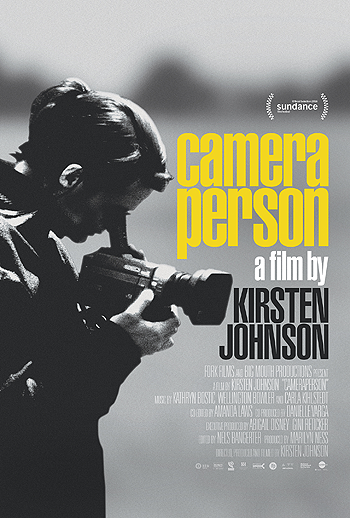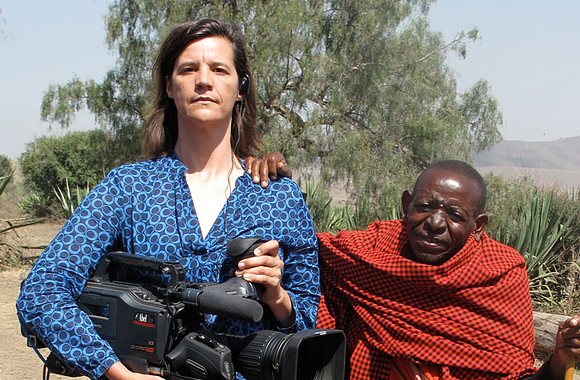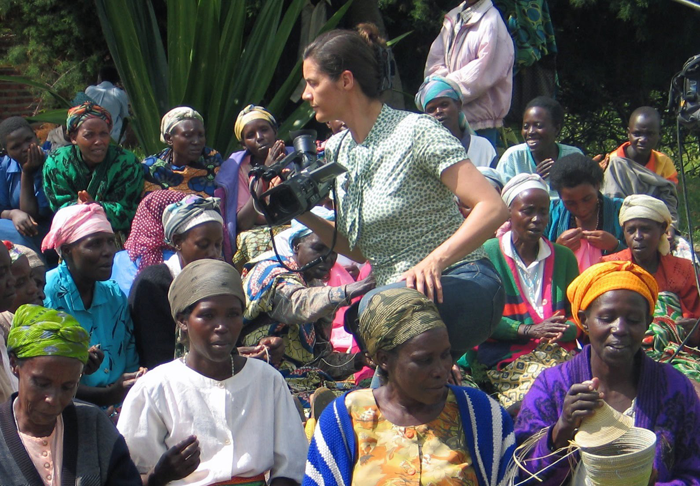by Anya Prokhorkina
May 28, 2016
 Have you ever wondered how do they film those stories that you see in the thought-provoking documentaries that deal with the complexities of the today’s world? What happens to the person behind the camera standing out there under the bullets? Kirsten Johnson shares her experience in personal essay film Cameraperson.
Have you ever wondered how do they film those stories that you see in the thought-provoking documentaries that deal with the complexities of the today’s world? What happens to the person behind the camera standing out there under the bullets? Kirsten Johnson shares her experience in personal essay film Cameraperson.
On sunny Sunday afternoon I had a ticket to see the Cameraperson, a film by a great cinematographer Kirsten Johnson, at the New Directors/New Films festival at MOMA. Weekend commute from Brooklyn Heights to Midtown is never a seamless thing to do. This time it took me 4 trains, a lot of confusion and speeding through the busy streets of Manhattan filled with people celebrating Easter. So by the time I reached the Titus Theater in MOMA Film Department my major thought was: “It better be worth it”.
I walked in 10 minutes late on a long shot of the landscape at the moment when the title CAMERAPERSON appeared on the screen. And then the woman behind the camera sneezed twice interrupting the silence of the theatre and causing laughter. That is something that would follow the film as it unfolds – laughter and tears, joy and sadness, intimate and public, life and death. Striking the balance between the opposites, Kirsten Johnson and her brilliant team of collaborators will take the viewer all over the world: Yemen, Rwanda, New York, Alabama, Kongo, Bosnia, Brooklyn, Afghanistan, Texas. The film is comprised of the footage from many films Johnson worked on. A long list comes up in the credits and it includes films by Laura Poitras, Michael Moore, and many more other directors that Johnson worked with over the course of her 25-year long career.
She is the main character of the film, yet we see her only once. However, we hear her talking with her crew members, local fixers and with her subjects quite often. Johnson reveals what usually stays out of the final cut of the films. She and her editor Nels Bargenter carefully curate those moments intercutting it with the footage of Kirsten’s family. What happens behind the camera usually stays behind the camera, but not in Cameraperson. Thanks to talented Mr. Bargenter in this film what usually is behind the scenes steps out into the spotlight without voiceover, without additional shots, using only the footage that was already there in the films and the simple intertitles with the location. Stories of women in Bosnia who survived massive rape, of a girl in Alabama that is about to go for an abortion, of midwife in a Nigerian hospital who tries to bring to life the baby who doesn’t breath. We see and hear how cinematographer, Kirsten Johnson, goes about filming and living through these stories of trauma, genocide, violence and war. We cry when she cries talking to the little boy who describes how his little brother dies, we smile together with her when her kids touch the camera lens and we feel relieved as she happily gasps when the baby in the Nigerian hospital finally starts crying.

During the Q&A Johnson talked about the trauma that she experienced and filmed during her career. She never had an opportunity to get a closure for that. You don’t just come to make a film about genocide, talk to the women who had been publicly raped and then move on – it does leave an imprint on your life. We know when people make films to deal with the trauma they went trough, to try and heal those wounds. But how do you keep living your life when your job as a cinematographer is to capture the drama around, to go where the drama happens and film it? As a filmmaker you have to be focused during the shooting and after the shooting is done most probably another starts, so rarely there is time to process what just happened to you. Cameraperson certainly has a therapeutic element for Kirsten Johnson and for all the people in the audience who has ever held a camera in their hands.

Of course, Cameraperson is also a celebration of the art of film. The way Dziga Vertov in his 1929 film Man with a Movie Camera celebrates the camera, the life that you see through it’s lens, the role of a filmmaker, the same way Kirsten Johnson, a Woman with a Camera in 2016 pays tribute to her job as a cinematographer that gave her access to so many places and people, that she would never been able to see without it. You can especially feel it in the footage of her mother, who has passed several years ago. Capturing her mother on screen makes the director feel like her Mom is still here and Johnson is grateful that she is able to freeze time that way. This attempt to get over her own personal trauma with the help of the camera, to bring her mother back, to trick death - is one of the most touching moments of the film.
From Russia, With Love A review of SCREENS: A Project About “Community”
The Inner Strength of Joan Didion
Basquiat—The Unanswerable Answer to the Art World
May It Last: A Portrait of the Avett Brothers
Move Over Hogwarts—The Practical Magic Is at Headfort
The Dog Days of Summer—Two Ways to Beat the Heat
The Mistress, the Publisher, His Son & His Mother
Santoalla-- the Spaces Between
Reading Arthur Miller in Tehran, The Salesman
Killing the ISIS Propaganda Machine, City of Ghosts
Bewitched, Bothered and Beguiled, The Beguiled– A Film Review
A Spoonful of Sugar-- Not Saccharine The Big Sick: A Film Review
Fiona and the Tramp, Lost in Paris- a review
Movie Review: Beatriz at Dinner
Accumulation: Sculptural work by Alben at Gallery Nines
SELFISH, Review by Heather Zises
Winter on Fire: Ukraine’s Fight For Freedom, dir. Evgeniy Afineevsky
Strange Days directed by Kathryn Bigelow (1995)
World of Tomorrow and the Quit-Bang Language of the Future
Quintet, Directed by Robert Altman, 1979
Let’s talk about the hard stuff: Get Out
Classic Movie Short Review: Croupier (1998)
